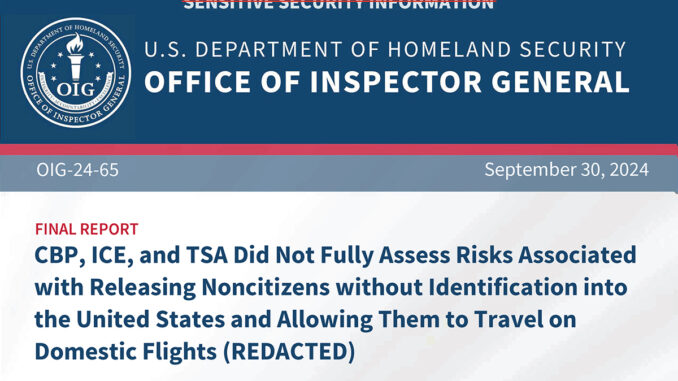
RALEIGH — A recent report from the Department of Homeland Security’s inspector general has raised concerns about potential security risks associated with the release of undocumented noncitizens into the United States and their ability to board domestic flights.
The report highlights several issues with current processes and procedures.
“Under current processes, CBP (Customs and Border Protection) and ICE (Immigration and Customs Enforcement) cannot ensure they are keeping high-risk noncitizens without identification from entering the country. Additionally, TSA (Transportation Security Administration) cannot ensure its vetting and screening procedures prevent high-risk noncitizens who may pose a threat to the flying public from boarding domestic flights.”
The report points out that while federal law stipulates that “noncitizens without ID are not admissible into the country and ‘shall be detained,’” both CBP and ICE are permitted to release noncitizens into the U.S. under various circumstances. This practice involves accepting self-reported biographical information, which is then used to issue immigration forms that allow for boarding on domestic flights, even without proper identification.
A significant concern highlighted in the report is the lack of comprehensive data on the number of noncitizens released into the country without identification. The inspector general requested data for fiscal years 2021 through 2023, but neither CBP nor ICE could provide accurate figures.
TSA relies on background checks and data from CBP and ICE to assess potential threats. However, the report suggests that if this data is incomplete, “TSA’s methods to screen individuals who pose a threat would not necessarily prevent these individuals from boarding flights.”
The inspector general’s report also mentions “similar weaknesses” in CBP’s screening processes that have allowed “high risk individuals into the country,” including an incident in 2022 when someone on the FBI Terror Watchlist was released.
In conclusion, the report warned, “If CBP and ICE continue to allow noncitizens — whose identities immigration officers cannot confirm — to enter the country, they may inadvertently increase national security risks.”
The Department of Homeland Security (DHS) did not concur with the inspector general’s findings. Both ICE and CBP pushed back on the report’s conclusions. DHS cited resource constraints as a significant factor, stating it “cannot detain all individuals subject to detention, including inadmissible noncitizens without ID, due to several reasons including a lack of resources (bed space).” ICE mentioned that its “currently funded detention capacity of 41,500 beds doesn’t allow them to detain every noncitizen who doesn’t have ID and valid documents.” CBP emphasized that its detention facilities are designed for short-term detention, and it can’t legally hold noncitizens longer than the law allows, even to mitigate potential risks.
TSA also responded to the report, stating it “doesn’t reflect their current policies.” However, the inspector general maintained the “recommendation is open and unresolved” until TSA provides evidence that the additional screening of noncitizens without IDs is “sufficient to reduce the security risk these individuals pose to an acceptable level.”
Earlier this year, North State Journal reported on an American Airlines flight filled with migrants headed from Phoenix to Charlotte. The report was based on images of the migrants sent to North State Journal by a North Carolina citizen who was on the flight.
According to TSA, passengers on commercial airline flights are required to show official government-approved identification and a boarding pass. It remains unclear if the migrants on the Phoenix-to-Charlotte flight had proper credentials or if they were sent through a “modified screening process,” as reported by the right-leaning news outlet Breitbart Texas.
North State Journal asked Charlotte Douglas International Airport and Charlotte city leaders, including the city manager and Mayor Vi Lyles, about the flight. A spokesperson for the city responded by saying in an email, “The city is aware of this but we cannot confirm the number of flights. We do not track this data.”
The spokesperson directed North State Journal to contact the Camino Center and the Latin American Coalition, citing them as nongovernmental organizations (NGOs) assisting migrants. A commercial airline provided confirming information to North State Journal that the tickets for the migrant flights are arranged and paid for by an NGO.
Many NGOs are receiving millions in taxpayer-funded grants through various programs administered by federal agencies such as DHS or the Department of Health and Human Services (HHS). The grants can pay for a variety of things for migrants, including clothes, cell phones, food, shelter, transportation and legal services that specifically serve migrants.
Some of the largest entities involved in migrant travel and facilitations are the American Red Cross, Church World Services and Catholic Charities USA.
The American Red Cross received $350 million from DHS and the Federal Emergency Management Agency’s food and shelter program in February 2023. Church World Services reported in 2022 tax filings that more than $114.6 million was from “government support.” Catholic Charities USA posted $1.4 billion in government grants in 2022 filings.



